Our sweat glands play an important role to cool down our bodies and regulate our temperature. Absent or nonfunctioning sweat glands are one of the key symptoms of ectodermal dysplasias. If you don’t sweat, you may experience health issues if prolonged overheating occurs and the body isn’t cooled. This can be serious for you, your child, or anyone that has ectodermal dysplasia if not prevented or treated.
If you are searching for ways to manage hypohidrosis, look no further! Today, we will explain why individuals with some types of ectodermal dysplasias don’t sweat and suggestions for how you can successfully manage it in your daily life.
What exactly is hypohidrosis?
A typical person not affected by an ectodermal dysplasia is born with approximately 2-4 million sweat glands. People born with some types of ectodermal dysplasia may be born with few sweat glands and the ones they have may not work normally. They don’t sweat normally. This condition is called hypohidrosis.
In our new library article about sweat glands and ectodermal dysplasias, pediatric dermatologist, Dr. Elaine Siegfried, explains that with less sweat glands, individuals with ectodermal dysplasia do not produce enough sweat to cool off their bodies, for “sweat production is controlled by the nervous system, in response to increased body temperature.”
There is a common misconception about hypohidrosis within ectodermal dysplasias, as people often think that the inability to sweat is only found in hypohidrotic ectodermal dysplasia (HED). Hypohidrosis is also present in ankyloblepharon-ectodermal defects-cleft lip and/or palate (AEC) syndrome, ectrodactyly-ectodermal dysplasia-clefting (EEC) syndrome and other types.
Read Dr. Siegfried’s article to understand how hypohidrosis can be easily mixed up with its opposite, hyperhidrosis, which is excessive sweating and how it differs from anhidrosis.
Learn more about Sweat Glands and Ectodermal DysplasiasSigns of Overheating If You Don’t Sweat
Our body temperature fluctuates throughout the day depending on our activities. If it is not regulated, it is all too easy to overheat. Significant overheating is called hyperthermia which could lead to serious medical consequences such as heat exhaustion, heat strokes, and possibly death. While those conditions are possible, taking preventive measures and using common sense will make them unlikely.
It is imperative to catch the signs of overheating early on to avoid health concerns. These signs typical consist of:
- Fevers
- A flushed face
- Red ears
- Lethargic movements
- Labored breathing
Your child will likely get crabby when they are hot so look out for that! Kids typically don’t want to end their playtime, even if their bodies begin to feel hotter than normal. So it is important to teach them that if they feel too warm, they must alert their parents or take action to cool themselves down in the ways they were taught.
If your affected child is a baby, you may not want to bundle in blankets as it they may overheat. Newborns should not be put under warming lights if jaundiced.
If you have little children who don’t sweat, urge teach them how to recognize if their body is heating up more than it should. Some parents teach their kids to say phrases such as “I’m getting warm” or “can I go somewhere cool?” whenever they are getting too uncomfortable. You will also find that children often instinctively seek the shade or cool areas to cool down.
How to Stay Cool
Our Cooling Guide is a great resource to learn more about hypohidrosis and to find cooling tips. Some of the best advice come from our families who have the most experience. They share with one another what they have learned in our different Facebook groups. Here are some things families said they use the most to keep cool:
- Cooling mattress pads – These mattresses have built on cooling technology to help regulate your body temperature during the night.
- Temperature monitor – This will allow you to pinpoint your child’s temperature easily.
- Cooling vests – These vests can be helpful for hot summer days or in situations where you may not have access to as much water. They even come in toddler sizes. They can be worn over your clothes to keep you feeling cool for hours. There are lots of companies offering a variety of different options.
- Cooling caps – Your head and upper body are prone to heating up quickly, and these caps will help you regulate your body temperature.
- Spray bottles – Not only are these fun to play around with, a quick spray is perfect for when you need a whiff of cool water. They are inexpensive and easy to carry with you at all time.
- Misting fans – You get the best of both worlds with this device – air flow and water!
- Wet your child’s shirt before going outside. Rewet as the shirt dries.
- Warm showers – Make sure that the shower is warm and not cold. A cold shower will shock their body. But, a warm shower will allow their body temperature to return to normal at a steady rate.
- Tint windows of your car to help prevent the sun from warming them in the back seat.
- Install an auto starter for your car. On warm days, start the car with the air conditioning blasting for several minutes to cool it down before getting in.
- Lots and lots of water – This tip cannot be stressed enough! Drink it. Wear it.
You can read more about hypohidrosis and how to chill out in the car.
Tips and Tricks When You Don’t Sweat
Rebecca Sylvester talks about her greatest struggle to keep her sons cool.
“My brother had HED growing up, so we had a game plan. I also have two sons with it. The greatest struggle would be when you get into a situation where you don’t know an easy way out to get cool, like on public transportation.
Or if there’s a long walk outside, and when we participate in summer sports. We plan what we do based on the weather. During school, my kids carry a camelback and wet their shirts. We love to stay at the lake during the summer.”
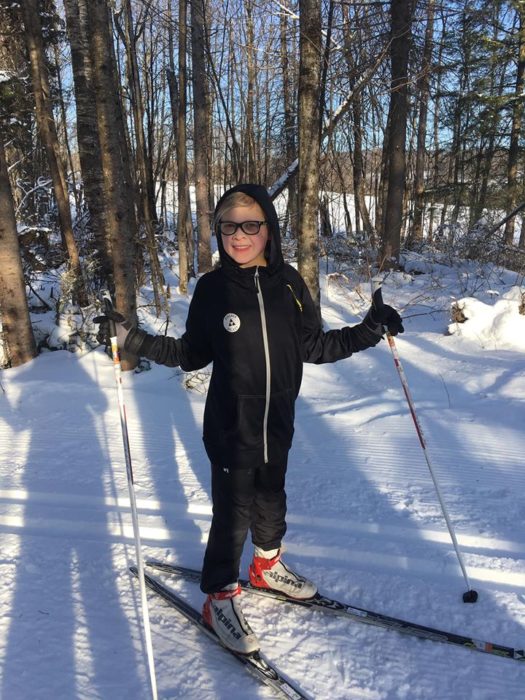
For NFED mom, Rebekah Parish, planning ahead helps her son Mason stay cool day to day. Mason is affected by HED.
“Awareness, preparation, and monitoring. We gauge our activities around the temperature and humidity levels when planning our day. My son, Mason, loves it outside, so we try and work around the higher temperatures to maximize that play time.
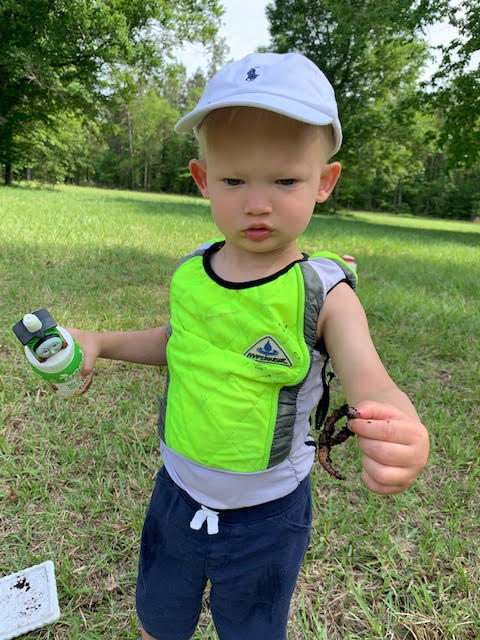
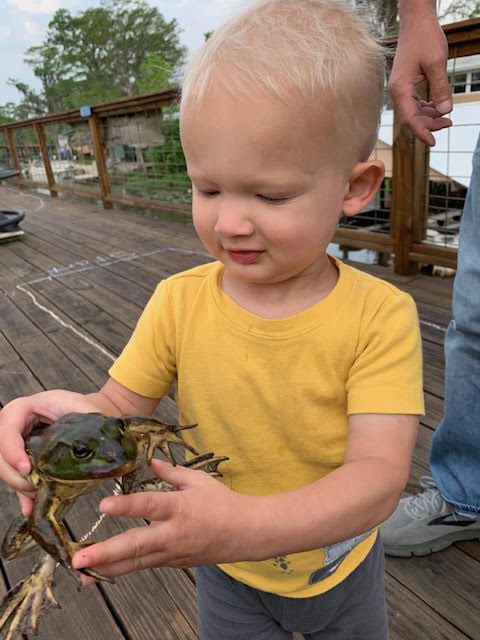
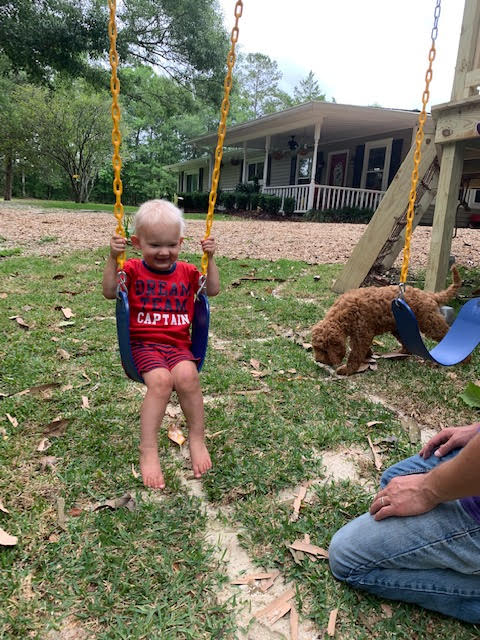
As temperatures increase, we continue to monitor him, moving him to shaded activities, adding his vest, a hat, or a cooling hat to extend his play. Most of his play areas have been set up in the shaded areas around our house. We schedule naps, indoor play, learning activities, library time, etc. during the hottest times of the day.”
Advice from Adults Who Don’t Sweat
Coping with hypohydrosis does get easier as your child gets older. They learn how to handle their condition without constant guidance from their parents. They will be able to use their independence to guide others through the same journey, just like 29-year-old Kevin Kronvall, who has AEC syndrome. He gives fantastic advice as talks about his journey with hyperhidrosis from when he was young, to today.
“It’s important to not let nature dictate how you choose to live your life though. Being outside and active were important to me, but you also have to understand, there are certain things that you may have to do to be able to enjoy it and adjust. The biggest struggle was remembering to hydrate and making sure I had adequate protection from the sun like a hat, sunscreen, wearing a rash guard style t-shirt or long sleeve. Finding the balance of being outside too long was tough.”
Kevin’s hypohidrosis has made him more aware of his actions and how to handle his condition.
“I think the biggest thing is the shift in accountability. When I was young, it was more on my parents to remind me to put on sunscreen or to wear a hat outside. As you grow older and become more mature, you build those proactive behaviors. You also start to understand the reasons why you take extra precautions. You always remember the times vividly when you didn’t put on the sunscreen-it burned for a few days- so better listen to mom now!”
Kevin is a big proponent of staying active and refusing to let your condition prevent you from engaging in outdoor activities.
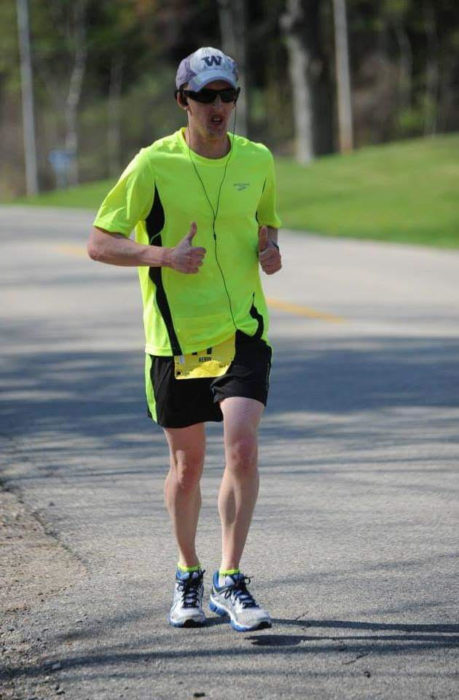
“I think the biggest thing parents can do is to get their kids involved in as many activities as possible, whether it be sports, theatre, etc. When you’re playing sports, you have to get creative. I played a lot of soccer growing up. I would get water and sunscreen at halftime or during a slow possession in play or ask to be subbed out since the inability to sweat would tire me out sometimes. As you grow older, you can kind of feel it in your skin when your body is starting to heat up a bit-kind of similar when you noticed you have eaten too much at a dinner and feel bloated.”
A key takeaway that Kevin provided is a truth that the NFED encourages all families to explore.
“The more involved the child is, the more confident they will become and embrace dealing with different situations and being able to overcome challenges such as not being able to sweat.”
We agree with Kevin. Kids who don’t sweat should not let their condition stop them from having fun. Teaching your child to figure out ways to do the activities they love will go a long way in helping them to be on teams, pursue sports and learn about themselves. Providing them with the tools to do that and safely is key. Virginia Higgins shared how she managed staying cool while exercising in her story, “I Have AEC, and I Can Run.”
What are your best tips or tricks on how to handle hypohydrosis? Let us know in the comments. We would love to hear your story!
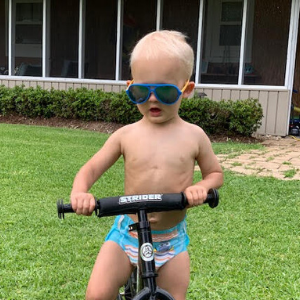
My husband was diagnosed with ed throughout genetics test two years ago our doctors don’t know anything about it so don’t know how to help or treat him is there anyone in uk that could help or get help with the cooling hats an shirts as we also have two grandsons with ed look forward to hearing from you many thanks
Hello. We are glad that you found our website. We encourage you to explore our website as we have lots of information about ectodermal dysplasias that you could print and take with you to educate your physicians. We help with cooling vests and an conditioner through our Treatment Assistance Program. You can learn more at https://nfed.org/treat/treatment-assistance-program/. Unfortunately, we do not help with cooling hats and shirts. You might consider contacting the Ectodermal Dysplasia Society in the UK to see if they know a doctor to help you. https://edsociety.co.uk/ Good luck and let us know if we can help you in any way. ~ Jodi, NFED, Director, Marketing and Communications
Hi my name is Jane I live in Delaware USA I Have developed ANHIDROSIS This yr in May I still can’t find a Dr. That has ever treated some one. You probably feel as lost as I do. I have terrible episodes when I get warm. Have lost my job. Getting ready to file for ssn disability. I think I know more about condition then any Dr. Right know.wish you luck in finding a Dr.
Hi, Jane! Please let us know if you’d like more information on getting a diagnosis and/or information on doctors we may be aware of in your area.
Thanks,
Veronica
Hello, I have the same syndrome, I have sweat glands, I do not have teeth, only two molars and I do not have hair either. I know that there are more people with my condition. to support my family the truth urges me a job since my daughter is suffering from microcephaly please if you could ask me to help with just one job ñara support my family I would appreciate it god bless you I live in Albuquerque NM currently we live with a person who lets us live in his living room please help me get a job where there is no heat
Hi, Cesar. Thank you for reaching and sharing your story. Unfortunately, we do not help people with finding employment so we are not able to help you. I’m sorry that we are not able to help you in that way. We wish you well in finding a job that works for you. Good luck! ~ Jodi, NFED, Director Marketing and Communications
My sister’s son got a high fever since 1 months and my sister stated he doesn’t sweat. Is it symptoms of ED? Does Ed effect on growing and learning ? Your reply would be very informative for me. I am so worrying right now.
Hi Sabita, while not sweating and high temperatures are symptoms of ectodermal dysplasias, a doctor really needs to make that diagnosis. I would recommend reading more about the symptoms on our website and accessing our documents that can be shared with doctors about the syndromes. Here are some links for you:
Symptoms Overview: https://nfed.org/learn/symptoms/
Resources for Doctors: https://nfed.org/treat/health-care-provider-resources/
Resources for Diagnosing: https://nfed.org/learn/diagnosis/
Cooling Tips: https://nfed.org/learn/library/stay-cool-cant-sweat/
Best of Luck,
Veronica
Hello, my problem is my burning feet. Most of the time my feet get warm at night, which interrupt my sleep. The room temperature is 60 degrees, I use a very thin blanket (in the winter), I can’t even tolerate the sheets on the bed. recently even my legs and the upper body gets warm and I don’t sweat. The burning feet interrupt my sleep which leaves me tired during the day. Any suggestions.
Hello. We recommend that you review information on cooling tips at https://nfed.org/treat/medical-treatment-options/. Perhaps, you could try pointing a small fan at the end of your bed and perhaps sleeping with your feet outside of the covers. The cool gel patches might help keep your feet cool. Best wishes as you find a cooling tip that works for you.
I don’t sweat if go to walk
We hope these tips and resources will allow you to keep from overheating on your walks.
~Kelley, NFED, Director, Family and Community Programs
I’m glad to see they are making strides in understanding this more. I’ve overheated all my life and as a young adult realized I didn’t sweat like others. My grandmother suffered the same. It’s worse with humidity too. Love the tips.
Hi, Stacey. Happy to know that you found this blog helpful. Make sure to register at https://nfed.org/join-us/ to receive more tips and advice. Or contact me at kelley@nfed.org.
Best,
Kelley Atchison
NFED
I used to sweet a lot up until I was in my tw 20s then just stopped sweating . Don’t know why ? Any info would be appreciated .
Hi, Randy.
We encourage you to consult with a dermatologist to determine why you have stopped sweating. If you are affected by an ectodermal dysplasia, you may find the information on our website helpful.
Best,
Kelley Atchison
Director, Family and Community Programs
Have not had any luck getting help for the total lack of face sweat over the last two decades. It really impacts everyday life and exercise.
I have not been able to sweat all my live and suffered from dry eyes for last view years.I am 61 years old now and all of a sudden I am able to sweat and my eyes are very moist like I was crying. What could have made this change,I am glad it happened but wonder what caused it.
Hello, Claudia. We do not have information as to why you have seen a change in symptoms. Please contact me at kelley@nfed.org with any questions.
Kelley Atchison
Director, Family and Community Programs
Hello, my problem is I’m not sweating at all I don’t know why?
Our staff is happy to assist you with questions. Please contact our office at info@nfed.org.
What kind of dr would I want to see to investigate whether my son can sweat? Or has sweat glands?
I’m in Minnesota
Hi, Kim – thank you for reaching out to us! Unfortunately, we have a lot of staff out of the office currently, but I would highly recommend reaching out to our Director of Family and Community Programs, Kelley. You can email her directly at kelley@nfed.org. In the meantime, this blog may be of benefit and link to other helpful resources: https://nfed.org/blog/tips-for-finding-a-doctor-or-dentist/. Best of luck! – Veronica
I have a daughter who is constantly hot but doesn’t sweat. She plays a lot of sports and last spring almost had a bad heat stroke during a game. Luckily, i caught on to her strange demeanor on the field and pulled her out of the game. I’ve brought this matter up to her pediatritan but she sort of brushed it off and said she was fine. Who can I go to to get her tested?
Hi, Michelle! That must have been very scary for you! Unfortunately, we have a lot of staff out of the office currently, but I would highly recommend reaching out to our Director of Family and Community Programs, Kelley. You can email her directly at kelley@nfed.org. In the meantime, this blog may be of benefit and link to other helpful resources: https://nfed.org/blog/tips-for-finding-a-doctor-or-dentist/. Best of luck! – Veronica
I stopped sweating directly at 20 every time I get to emotional or I’m out in the sun this painful prickly feelings runs over my entire body which causes me to scratch all over even though it don’t work is this normal for somebody who don’t sweat because I run from that pain. It has stopped me from stepping outside even in the winter
Hi, Cameron! Have you been diagnosed with an ectodermal dysplasia? Unfortunately, I am not a medical professional so don’t have the expertise to answer your question directly, but we highly recommend reaching out to your doctor to explore what might be causing this.
If you’d like help finding a doctor in your area that might have experience treating individuals with ectodermal dysplasias, please contact us at info@nfed.org, and we can see if we know of anyone in your area!
Thanks for reaching out, and I hope you can get some assistance soon!
-Veronica
Cameron, have you managed to find out what causes this? I suffer from the exact same condition as you and it interferes with everyday life BIG time. As well as the painful prickly feeling, I develop like a rash with all bumps in the affected part that goes away once i cool down
This could be a heat rash.
Our son had 75% 3rd degree burns. Grafts on arms legs and back. He cant cool down. He’s going crazy. We need advice pkease
Hi, Diana: I am so sorry to hear about your son! Is he also affected by Ectodermal Dysplasias? Our advice is really tailored for individuals with that specific diagnosis, and most of our cooling advice has to do with using water directly on the skin or cooling vests, and I am not sure that would be safe for your son, with his burns. My best advice would be to contact your doctor to get advice, as they know his history and direct needs. Best wishes to you – Veronica
Hello,
Im a female in my 40s and I dont sweat during the day. I will overheat easily and quickly when outside in warm weather. I am sensitive to cold too. So I use ice packs on my groin to cool down my blood. I do wake up drenched though. Almost every night and we keep our house cool. Im not on meds and only am on the cusp for thyroid, but sugar always reads fine. Not sure what is going on, but its been this way for a long time.
Hi, AJ – it is so hard to say why you aren’t sweating. If it is associated with an ectodermal dysplasia, you would most likely have other symptoms, which you can review here: https://nfed.org/learn/symptoms/. Of course, all of our information is associated with that diagnosis. I would recommend talking it through with your doctor to see if exploring and ectodermal dysplasia diagnosis makes sense for you. Unfortunately, there are no cures for ectodermal dysplasias, but we do have a lot of advice and treatment information on our site. Best of luck to you! – Veronica
Hi , i use to run and exercise no problem. I was in a major car accident, occipital dislocation, and now I don’t sweat. I w
Can only ride my bike if it’s under 80°. This is the worst as I live in Texas so hot! I went for a walk and had to stop after a mile with heat exhaustion. It’s really scary, I had water but that’s not enough. I stopped at a model home and laid on the floor for in the air conditioning for an hour before I could make it home.
Is it possible to build up a tolerance to the heat?
Hi, Suz. Because everyone’s situation is different, and I am not a medical professional, I don’t have the expertise to answer your question accurately. I would highly recommend discussing this with your doctors. We do offer resources on how to stay cool, if that is helpful: https://nfed.org/learn/library/stay-cool-cant-sweat/ and https://nfed.org/wp-content/uploads/2016/06/Cooling-Guide.pdf. Thanks – Veronica
I can’t sweat, but my husband swears like crazy from his head. I have a cool bath two to three times a day.
I had my sweat glands removed and wonder where the fluid goes. Does it cause fluid retention please.
Hi, Goria: Because we focus on the lack of sweat glands, caused by a genetic mutation, we don’t have information about what having your glands removes means. We highly recommend speaking to your doctor/surgeon or other medical professional to advise you on this questions. – Veronica
I am a 77-year-old woman. I have been sports active all my younger life, triathlons, marathons, paddled outrigger, and more. I have NEVER sweated. I have head hair but little potty hair and no other hair on my body. It has never been an issue, yet my children sweat LOTS.
I became I’ll almost 5 years ago, had a ver high fever, ingestions
Issues, developed Raynald’s, and whatever this disease is it has worsened. I am unable to sweat even in 100 degree weather. My body feels as though it is on fire. Veins began appearing all over my body and burst. I have been to doctors at Mayo, University of Penn,, UCSD and no help. If you can, help refer, I would appreciate any advice. I am 69 years old.
Hi, Janice: That must be very scary for you! Were you diagnosed with an ectodermal dysplasia specifically? If you were, I would recommend reaching out to our director of family and community programs, Kelley, at kelley@nfed.org, to see if we have any doctors in your area we could recommend.
Best, Veronica
Hi
Greetings from Australia.
I have this condition where my skin is extremely dry since birth and I dont sweat. I have to constantly apply cream on my body specially after shower. The dry skin can happen in either summer and winter so there is no single day where I don’t apply the cream. I am using QV products.
My problem is I don’t sweat at all …even if I work out or I go out in sun , my skin gets hot and it turn red. This is like this since I was a kid. Do you know what condition is this and if there is any medication or treatment available?
Hi, Khiz: There are many things that could cause the inability to sweat, including ectodermal dysplasias. I highly recommend asking your doctor based on your symptoms. If they believe this could be ectodermal dysplasias, there are genetic tests available to help determine which syndrome you might have. Unfortunately, there are no cures for ectodermal dysplasias right now, but we have created articles like this and other resources on our site to help prevent overheating if you don’t sweat, as well as, managing dry skin. – Veronica
No Ryan haven’t had the money just now getting my life back together I should know by next winter time this summer I’m going to just go to work and hurry and get back home lol.
Just wanted to let you guys know this article has a couple places where you guys left in some notes: (add in photo here). Might want to proofread and fix those.
Thanks for letting us know, Cathy! I have updated the blog accordingly. – Veronica
I just turned 60. i have bever sweated past a bit of sticky feeling. Never had rolling sweat beads, even while jogging in 104 degrees! and now i am starting to sweat!!! What happened? I just experienced my first in 60 years a sweat bead down ny face when i was working outside!
I’m Rubal from India, having a daughter of X genetics issue of ectodermal deplyasia since birth.
* Body heating issue
*No hairs, nails and teeth
*Extreme dry skin
Could you please help me with tips and diet to manage body heat issues by considering India’s hot humid climate in Delhi
+919205134125
Hello, Rubal. Please contact our office at info@nfed.org and we will provide you with information.
Thank you,
Kelley Atchison
Director, Family and Community Programs
Hello, I don’t sweat, even with going into HITWORX exercising in 129 degree heat. But I’ve never noticed a problem with overheating.
I do have unexplained extra weight so I wonder if I have a problem where my body in general won’t expell things in general?
Hello, Leah. Are you affected by an ectodermal dysplasia? We hope the Cooling information on our website will benefit you. We encourage you to speak with your primary care provider about your concern for overheating. ~Kelley, NFED. Director, Family and Community Programs
I live in Florida and used to sweat, which I don’t mind hindsight, I somehow got sjorgens syndrome and now I don’t sweat at all , I end up overheating and feeling sick and lethargic with chest pains, what can I do to make myself sweat and get back to normal
Hi Dana,
That sounds really challenging—while you may not be able to restore sweating, staying cool with tools like cooling vests, hydration, and managing Sjögren’s symptoms with your care team can help reduce overheating and improve how you feel. Please feel free to reach out to our office at info@nfed.org for more support.
Hello, I haven’t sweat for the past 30yr. But it has come to a point where is frustrating. I like the outdoors, but can enjoy do to not sweating. I’ve had had several episodes where I have to go and shower to bring my temperature down. I saw a dermatologist and didn’t know anything about my problem. I need a doctor who treats anhidrosis in central Florida. Please
Hi George,
That sounds incredibly frustrating, we’re so sorry you’re going through this. You’re not alone, and we’d love to help. While we can’t give medical advice, we recommend reaching out to our office at info@nfed.org so we can provide you with resources and connect you to providers familiar with anhidrosis or ectodermal dysplasias in your area.